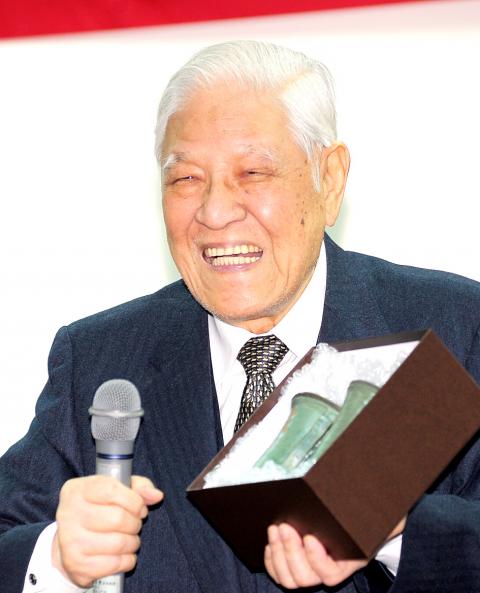Former president Lee Teng-hui (李登輝) yesterday said he is in favor of lowering the threshold for constitutional amendments and the voting age, and suggested that a referendum on whether the Constitution should be amended to replace the current semi-presidential system of government with a parliamentary system be staged alongside next year’s presidential election.
Lee made the remarks in a speech, titled “Constitutional reform is Taiwan’s only way out,” he delivered to the Legislative Yuan Press Club.
Calls from across party lines and from many civic groups for constitutional changes point to a rare opportunity to unite a divided public and put reform into practice, he said.

Photo: CNA
Lee proposed a two-stage reformation process. The first stage should include reducing the threshold for constitutional reform, rectifying the Referendum Act (公民投票法) and lowering the voting age to 18 — among other proposed amendments. A referendum on the draft amendments could then be held to seek public endorsement.
The current threshold for amending the Constitution requires the support of one-quarter of the Legislative Yuan to put forward an amendment, three-quarters of the legislators to attend a meeting to deliberate the proposed amendment and then three-quarters of the attendees to approve the proposal.
If approved by lawmakers, the proposed amendment must be put to a referendum, which requires half of the entire electorate to vote in favor for it to be considered passed.
In terms of changing Taiwan’s government structure, Lee said the number of Legislative Yuan seats must be increased and the legislative electoral system be overhauled, while clear lines of accountability between the president and premier must be drawn.
The president should be entitled to direct national defense and foreign affairs, including cross-strait relations, under the supervision of the legislature, Lee said.
He called for the legislators to pass draft amendments for such reforms in the first half of this year so that the proposals could then be put to a referendum next year to seek a public mandate.
The former president said he would personally facilitate talks between Chinese Nationalist Party (KMT) Chairman Eric Chu (朱立倫) and Democratic Progressive Party Chairperson Tsai Ing-wen (蔡英文) after the Lunar New Year holidays, as well as the leaders of other parties, to set out a timetable for constitutional reform.
Chu and Tsai are responsible for laying out specific claims to constitutional reform to bring about new changes, rather than taking advantage of the situation to further their political ambitions, Lee said.

AGING: As of last month, people aged 65 or older accounted for 20.06 percent of the total population and the number of couples who got married fell by 18,685 from 2024 Taiwan has surpassed South Korea as the country least willing to have children, with an annual crude birthrate of 4.62 per 1,000 people, Ministry of the Interior data showed yesterday. The nation was previously ranked the second-lowest country in terms of total fertility rate, or the average number of children a woman has in her lifetime. However, South Korea’s fertility rate began to recover from 2023, with total fertility rate rising from 0.72 and estimated to reach 0.82 to 0.85 by last year, and the crude birthrate projected at 6.7 per 1,000 people. Japan’s crude birthrate was projected to fall below six,

Conflict with Taiwan could leave China with “massive economic disruption, catastrophic military losses, significant social unrest, and devastating sanctions,” a US think tank said in a report released on Monday. The German Marshall Fund released a report titled If China Attacks Taiwan: The Consequences for China of “Minor Conflict” and “Major War” Scenarios. The report details the “massive” economic, military, social and international costs to China in the event of a minor conflict or major war with Taiwan, estimating that the Chinese People’s Liberation Army (PLA) could sustain losses of more than half of its active-duty ground forces, including 100,000 troops. Understanding Chinese

SELF-DEFENSE: Tokyo has accelerated its spending goal and its defense minister said the nation needs to discuss whether it should develop nuclear-powered submarines China is ramping up objections to what it sees as Japan’s desire to acquire nuclear weapons, despite Tokyo’s longstanding renunciation of such arms, deepening another fissure in the two neighbors’ increasingly tense ties. In what appears to be a concerted effort, China’s foreign and defense ministries issued statements on Thursday condemning alleged remilitarism efforts by Tokyo. The remarks came as two of the country’s top think tanks jointly issued a 29-page report framing actions by “right-wing forces” in Japan as posing a “serious threat” to world peace. While that report did not define “right-wing forces,” the Chinese Ministry of Foreign Affairs was

US President Donald Trump in an interview with the New York Times published on Thursday said that “it’s up to” Chinese President Xi Jinping (習近平) what China does on Taiwan, but that he would be “very unhappy” with a change in the “status quo.” “He [Xi] considers it to be a part of China, and that’s up to him what he’s going to be doing, but I’ve expressed to him that I would be very unhappy if he did that, and I don’t think he’ll do that. I hope he doesn’t do that,” Trump said. Trump made the comments in the context